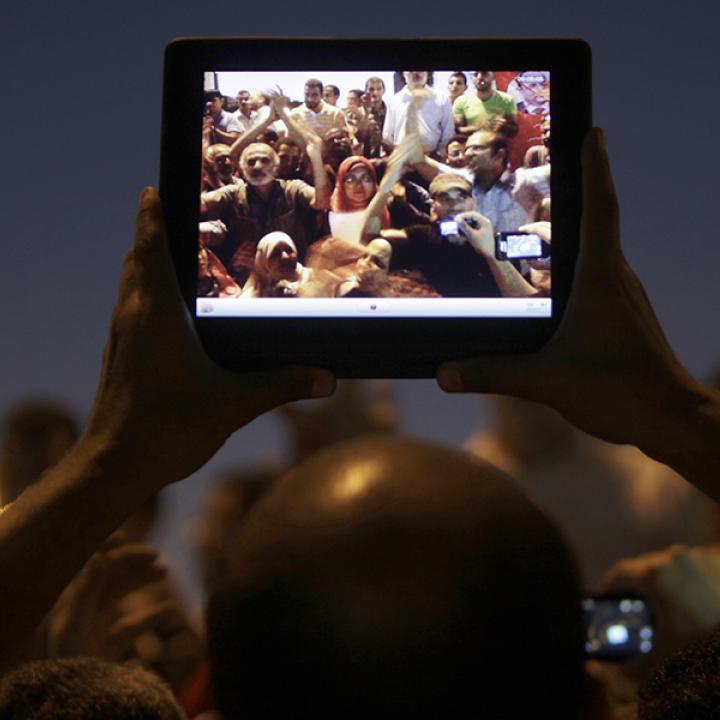
- Policy Analysis
- Fikra Forum
The Source of Fake News in the Middle East

The concept of “fake news” has gained traction in the United States because of politically motivated conspiracy theories. In the Middle East, politics has always involved a discussion of conspiracies. Some satellite news channels detail Qatar’s alleged network of secret agents and illicit funding aimed at overthrowing Arab governments, while some social media spread the idea that Hillary Clinton founded the Islamic State. Fake news plays an important role in shaping Middle Eastern political culture, but research on this topic is light.
Studies of conspiracy theories in the Middle East tend to focus on why individuals are prone to believe such theories, mostly from a psychological or anthropological perspective. Some argue the region’s cultural context makes it a breeding ground for conspiracies. The author Daniel Pipes argued in his book, The Hidden Hand: Middle East Fears of Conspiracy, that pre-Islamic Persian religions’ dualistic worldview contributed to modern Iranians’ fear of evil conspiracies. Others point to the region's recent history of all-too-real conspiracies, such as the Sykes-Picot agreement, the Suez Crisis, and the CIA’s ouster of Iranian Prime Minister Mohammad Mossadegh as evidence of why people in the Middle East are fearful of foreign plots. Al-Arabiya’s Mahmdouh al-Muhaini suggests that people in the Middle East deal with political, social, and religious changes through acceptance of conspiracy theories as a psychological crutch.
Such appeals and explanations portray believers of conspiracy theories as victims of historical or cultural circumstance. At worst, they dismiss the fake news issue as a problem of ignorance and fear. Most minimize or ignore the role of autocratic leaders in actively promoting conspiracy theories for their own ends.
Autocratic states achieve multiple goals by deploying conspiracy theories through their agents and preventing serious journalists and intellectuals from challenging them. An ostensible Zionist or American conspiracy deflects blame from their own regimes’ shortcomings, while simultaneously uniting citizens in nationalist fervor. Lisa Weeden documented in Ambiguities of Domination that Bashar al-Assad spread multiple theories to clutter the airwaves and confuse citizens, intellectually paralyzing them. The tactic was useful to identify the most loyal subjects and publicly demonstrate the power of the regime. Having an accomplished journalist claim on national television that last night’s hail storm was the work of an Israeli weather control device certainly demonstrates to the public that ‘facts’ and ‘reality’ are subjective and secondary to loyalty.
Gabriel Koehler-Derrick, Richard A. Nielsen, and David Romney conducted a study on the autocratic state’s promotion of conspiracy theories in detail. In "Conspiracy Theories in the Egyptian State-Controlled Press," the trio examined state-run and semi-independent newspapers during three periods: the years running up to Egypt’s 2011 revolution, the intermittent period between the revolution and the “Tamarod,” or rebellion movement, and the days and years after the Egyptian military overthrew President Muhammed Morsi. Their study found that after the initial revolution, mentions of conspiracy theories went up – a trend that continued with Morsi’s ousting.
After Mubarak fell and the regime struggled to reorganize, the semi-independent newspaper al-Masry al-Youm, sensing the easing of restrictions, published theories of conspiracy between the Muslim Brotherhood and the military. However, after the military re-established firm control, both al-Masry al-Youm and the state-run al-Ahram immediately began spreading theories of a Muslim Brotherhood conspiracy to dismantle the state, theories which exonerated the regime. Al-Ahram more outrageously began claiming the existence of an American conspiracy to control Egypt through the Muslim Brotherhood.
Moreover, while anti-Western conspiracy theories are frequently portrayed, correctly, as the work of Islamist organizations like Hezbollah, the Iranian regime,or the Muslim Brotherhood, they have far wider origins and appeal. Koehler-Derrick and his associates document media organizations linked to the Egyptian regime, a chief Arab recipient of U.S. foreign aid, propagating theories of an American-Islamist conspiracy. In fact, it was supporters of the Egyptian military who began the calumny which attributed the founding of the Islamic State to Hillary Clinton. Indeed, the region is filled with Western allies who fuel this fake news epidemic. Recep Tayyip Erdogan, president of the NATO member Turkey, has similarly accused the United States of using the Islamic State, the Kurdistan Workers’ Party (PKK), and Gulenists to weaken and attack Turkey. An Emirati security official and an Iraqi politician also gained prominence for promoting a theory that former-President Obama’s perceived ‘soft’ approach to Iran was due to his supposed Shia heritage.
Such wide scale propaganda campaigns dictate the terms of the discussion by altering the public’s perception. In 2011, Pew found that only 22 percent of Jordanians believed Arabs committed the 9/11 attacks, down from 39 percent in 2006. Lebanese respondents scored slightly higher with 28 percent blaming Arab nationals for the attacks. Such misconceptions not only deepen the divide between the Middle East and the West, they exacerbate the challenges the region faces. Theories of Western anti-Islamic conspiracies feed into the narratives and recruiting of groups like al-Qaeda and the Islamic State while cementing autocratic rule and thus retarding economic and human development.
The international community has spent decades trying to promote democratic reforms in the Middle East. They shed trillions of dollars and rivers of blood to combat salafi-jihadi terrorists, but precious little to neuter the maligning impact of officially sponsored fake news on Middle Eastern discourse. A developed society requires a developed discourse, which values objective truth and holds the powerful responsible. A comprehensive approach to challenging these fanciful narratives requires an understanding that the states around which political life orbits emanate rays of falsehood that blind and disorient their own publics.
